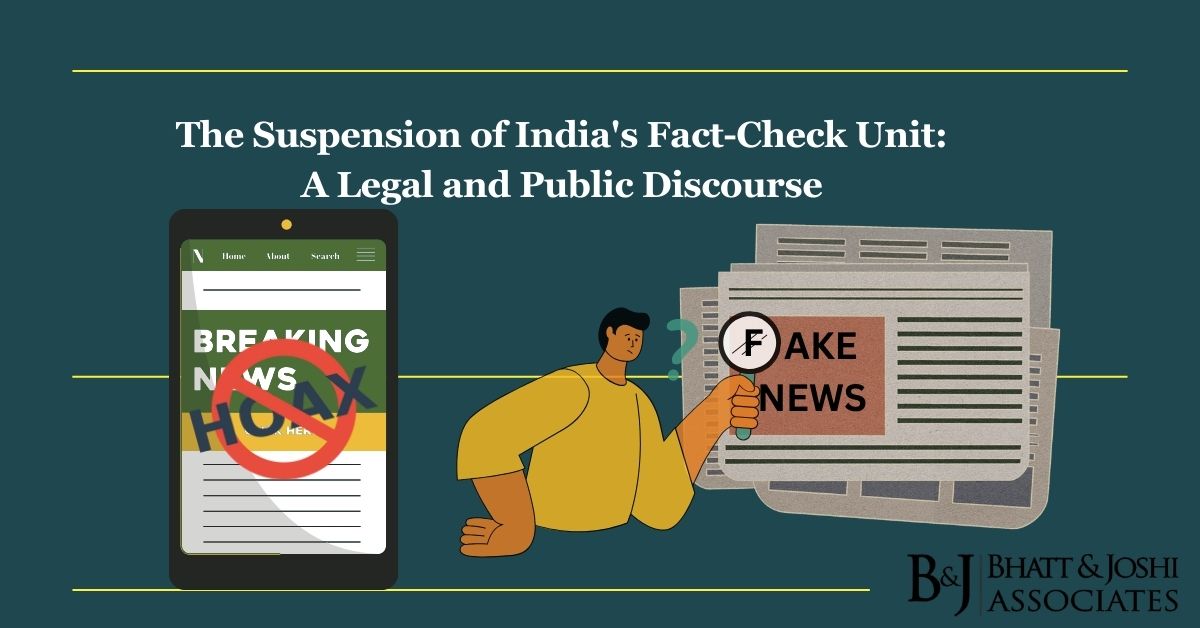The Supreme Court’s Interim Stay on the Fact-Check Unit under IT Rules and its Constitutional Echoes

Introduction
In a pivotal moment for digital rights and freedom of speech in India, the Supreme Court has temporarily halted the implementation of the Fact-Check Unit (FCU), established under the Information Technology (Intermediary Guidelines and Digital Media Ethics Code) Amendment Rules 2023. This decision underscores the ongoing debate surrounding government regulation of online content and its implications for fundamental rights.
The Genesis of the Controversy
The Notification of the Fact-Check Unit
On April 6, 2023, the Ministry of Electronics and Information Technology notified the establishment of a Fact-Check Unit tasked with identifying and flagging “false, fake or misleading” information concerning the Union Government on social media platforms. The initiative was part of the broader Information Technology (Intermediary Guidelines and Digital Media Ethics Code) Rules, aiming to curb the spread of misinformation online.
The Mechanics of Fact-Checking
Under the amended IT Rules, social media intermediaries were obligated to take down posts flagged by the FCU. Additionally, internet service providers were required to block URLs to such content. Failure to comply could result in these platforms losing their ‘safe harbour’ protections, which shield them from legal accountability for user-generated content.
Legal and Public Backlash Against the Fact-Check Unit Suspension
Immediate Legal Challenges
The establishment of the FCU was met with immediate legal challenges. Comedian Kunal Kamra, the Editors Guild of India, and the Association of Indian Magazines, among others, filed petitions against the amendment, arguing it posed serious risks to free speech and was arbitrary in its targeting of content related to the Union Government alone.
Supreme Court’s Intervention
The Supreme Court’s decision to stay the operation of the FCU until a final decision by the Bombay High Court highlights the constitutional questions raised by the IT Rules amendment. The Court emphasized the need for a thorough analysis of the amendment’s impact on the fundamental right to freedom of speech and expression.
Diverse Perspectives on Fact-Checking and Free Speech
The Government’s Stance
The government defended the FCU, arguing that flagging false news does not lead to automatic content takedown. Instead, it suggested that intermediaries are notified and given the option to remove the content or provide a disclaimer. This approach purportedly aims to protect the public from misinformation while preserving free speech.
Critics’ Concerns
Critics, including digital rights groups and opposition parties, argue that the FCU and the IT Rules amendment could lead to online censorship and abuse of power. The vagueness of terms like “fake,” “false,” or “misleading,” and the government’s unilateral power to decide on these matters, were seen as threats to democratic discourse and press freedom.
Judicial Review and Constitutional Scrutiny
The Bombay High Court’s role in reviewing the constitutional validity of the IT Rules amendment is crucial. Previous cases, such as the landmark Shreya Singhal vs. Union of India, have set strict procedures for blocking content and emphasized that restrictions on free speech must be reasonable and proportionate.
Conclusion: Regulatory Challenges Amid Fact-Check Unit Suspension
The ongoing legal battle over the Fact-Check Unit and the IT Rules amendment reflects a broader struggle to balance government efforts to combat misinformation with the need to protect free speech and democratic engagement online. As the judiciary continues to scrutinize these measures, the outcome will likely have far-reaching implications for digital rights and governance in India.
The Supreme Court’s stay order not only halts the immediate implementation of the FCU but also sets the stage for a deeper examination of how nations navigate the complex terrain of information regulation in the digital age. The final decision, expected to emanate from the Bombay High Court, will be a landmark judgment on the limits of government authority over digital content and the protection of fundamental rights in the digital era.










